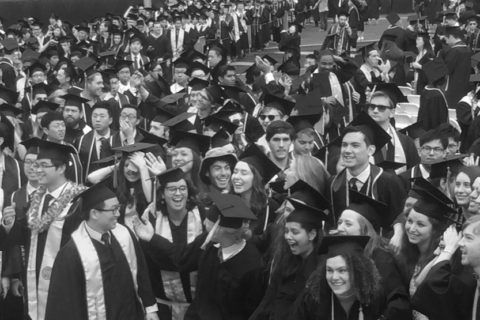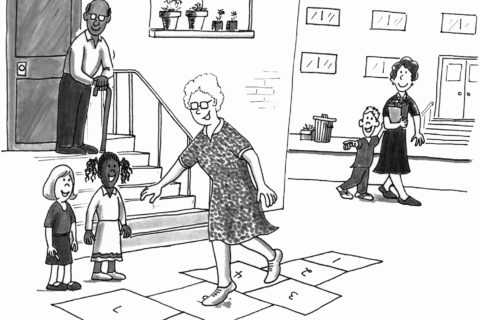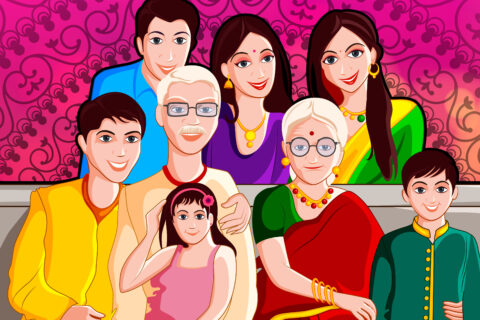
May is college graduation month, the time for celebration for students and their families. But only 4 out of 10 American students, get that privilege. A four-year college degree seems to be the ticket to ride — with access to illustrious jobs. Middle- and lower-income families, however, find it unaffordable and remain stuck behind the vicious cycle of class barriers.
Universities, especially nationally ranked research institutes, are expensive and hard to get into, as rated by U.S. News. Private colleges are selective. They raise funds from rich alumni. Even public universities that offer a similar breadth of curricula do so to attract prominent researchers to the faculty. To entice professors, universities must offer the best research facilities. Research fuels innovation which in turn boosts the US economy.
What works, needs to be preserved.
Most students attend college to find good jobs, not to be researchers. Yet they are burdened with the high cost of tuition and living expenses, for four years. The cost of college education keeps outpacing the cost of living, making it unaffordable for more and more families. According to Forbes, “from 1980 to 2020, the price for a four-year college, after inflation-adjusted, increased by 180%.”
Graduates of underfunded and understaffed high schools in low-income neighborhoods generally do not meet the criteria for college admission, and continue to remain in the middle or lower tier of society.
A report from the National Center for Education Statistics states “in 2020, (only) 62 percent of high school completers immediately enrolled in 4-year institutions.” And by most accounts, the college dropout rate is 30-35 — mostly due to financial reasons.
Employers are also overly impressed by applicants with Ivy League degrees. The selection process, low acceptance rates (4-8%), and high tuition make them out of reach for a large percentage of American students.
I propose a 2-year professional degree instead.
Four-year degree colleges, private and public, offer students far too many courses than necessary. In this process, students rack up college loans. Also after four years, many areas may not be in a hot job market, or the students may not have selected the right major, to pay back their debt. They and their family are saddled with decades of student loan payments.
President Biden’s student loan forgiveness program is a temporary Bandaid. Plus further government spending tends to increase inflation, resulting in higher interest rates for the current college applicants.
I attended a four-year engineering college in India. Then I enrolled at UCLA and earned my master’s degree in electrical engineering. With the help of my professor, I landed a well-paying job in Silicon Valley.
Looking back at my 35-year career, I see that I used only a small sliver of my college education. Did I learn how to keep learning, and to analyze problems? Of course, I did. Did I land in the hot job market? A resounding yes. By luck or serendipity, I opted for electrical engineering because I had been introduced to electric currents and circuits in high school, and happened to like it.
A shorter, more focused, and more intense college experience can be richer, where students are more likely to apply themselves. I went into circuit theory, designing electronics hardware that could be used in different systems and industries. I could have learned to do that in just two years but had to learn electromagnetic theory, mechanical drawing, solid-state physics, and programming, too.
Outside the rigor of problem-solving and critical thinking, while working intensely on the selected major, students need professional skills for the work environment such as writing, communication, and teamwork. General education takes longer to absorb and must be built into the curriculum, like in an MBA program. In my view, for good job prospects, we need to be apt in presenting ourselves, in our professional interactions, and have theoretical expertise in the chosen discipline.
I also learned much from living with other students in university housing. Learning about their diverse backgrounds and their approaches to problem-solving was an enriching experience. Plus it took me out of my home environment — to develop myself more fully.
The two years professional college degree can be made to work with higher success, I claim. People like Bill Gates, Steve Jobs, and Mark Zuckerberg did not finish college. In a speech at the Ivey Business School at Western University in 2012, Warren Buffet said, “I don’t think college is for everyone,” adding that none of his three children graduated from college. But they all got started on college education till they found their path.
We need college degrees for all college-bound students and not just the exceptions. Plus, colleges, with the same number of professors and buildings, can then start graduating twice the number of students and imparting more relevant education, I think.
I believe my proposal for advocating a two-year professional degree program has a lot of merit, even if it may not work for all disciplines, such as medicine or astrophysics. Making changes in the education system is a long and hard process, to maintain standards of excellence.
But we must strive to change it, to fulfill the promise of America, “the land of opportunity,” for all.








Priya D.
Interesting thoughts but I feel college serves for more than just vocational training. For those who live away from home, it is their first chance at "adulting" and independent problem solving. Even courses that are seemingly not "used" in the job leave you with a way to think and analyze and generally move through life as an educated person. Personally, I am a big fan of the American liberal arts education model. I think we would be short-changing our youth if college was shortened by 2 years.
vinitagupta
We need to see problem from both ends, I agree.
Sreedhar Menon
SUPER ARTICLE VINITIA! ONE OF THE COMPELLING REASONS AT TO WHY I HAVE BEEN SUPPORTING THE SHANTI BHAVAN SCHOOL CHILDREN FOR NEARLY 25 YEARS! THANK YOU SO MUCH FOR JOINING MY INITIATIVE AND CONTRIBUTING TO SHANTI BHAVAN SCHOOL!
R. Paul Singh
Agreed but how do we differentiate it from 2 year colleges. So why not change that system instead as that is already affordable
Vijay Gupta
A major revolution, or disruption, in the education system is fairly imminent. For example, the Khan Academy has already come out with AI-based tutors that can teach math (and other subjects) to K-12 students.
https://www.youtube.com/watch?v=hJP5GqnTrNo
Their software provides personalized guidance the way a human teacher/tutor does while teaching one-on-one. But humans teach an average class of 30 students, so they can’t teach the top students and the bottom students effectively at the same time.
Moreover, this AI-based tutor is improving at lightning speed. Pretty soon, students may find that they can learn much better and faster with this software than with traditional methods. So perhaps they can learn the first two years worth of college courses (such as general education and basic science courses) during the K-12 schooling itself. Then the 4-year college can be easily reduced to a 2-year college focused mainly on professional courses.
Hemant Lall
My father was a big believer of vocational education with 2-yr degrees. He played an important role in the growth of Delhi Polytechnic in 1960’s. However, he sent me to a 5-yr undergraduate university in Kanpur and a 4-yr graduate university in Dallas. Like Vinita points out, there is an important role for both in society. Now Vijay Gupta adds an intriguing 3rd dimension: AI based tutors … how times are changing!
Florence
Great article. Four-year universities should also incorporate classes or time to teach students to network and other professional life skills. I have heard that professional universities do more of this, but, as you mentioned, they are out of reach for many. This is especially needed for students from lower-income families, first-time college students and first and second generation immigrant students. Upward mobility is much harder for these individuals. In recent years Community Colleges have incorporated life skills classes, but public 4-year are still behind.
vinitagupta
Thanks Florence for your thoughts. You speak from real life experience.